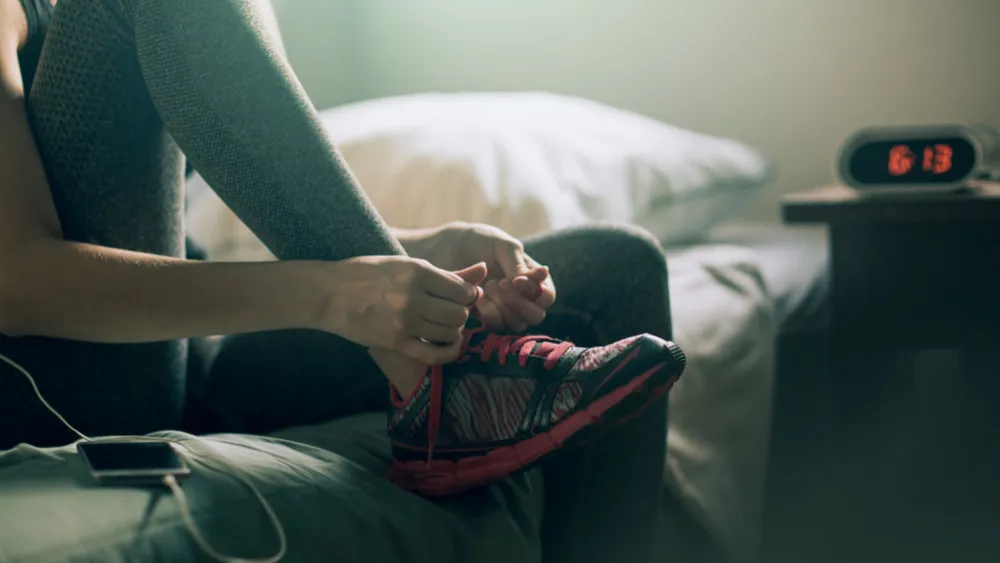Healthy Lifestyle
Got the COVID-19 Winter Blues? Fight Back With Exercise and Sleep
Published: Jan. 20, 2021

If you’ve lived in Nebraska or Iowa long, you know it can be difficult to stay active during the winter months.
Like so many others, I frequently find myself cooped up in the house during these long, cold days. While some of us experience cabin fever and just want to get out and about, others may be dealing with something more serious: seasonal affective disorder.
With COVID-19 thrown into the mix, those feelings can be magnified as opportunities to do things outside of the home have dwindled. It was already challenging over the past year to connect with friends, head to the gym and plan social outings – which can lead to feelings of anxiety and even depression. According to one study, three times as many Americans showed symptoms of depression during the pandemic than before.
Now, with the one-two punch of COVID-19 and the depths of winter, many people run the risk of having mental health challenges.
The Link Between Exercise, Sleep and Mental Health
What can you do to decrease your risk for anxiety and depression? My first recommendation is to get regular exercise. Not far behind is having good sleep habits.
Exercise can be an important tool for your mental health, preventing or easing symptoms of depression and anxiety by:
- Allowing you to build bonds and social connections if you work out with others
- Helping your body release feel-good endorphins
- Improving your confidence as you reach your fitness goals
- Keeping your mind off stressors in life
- Improving the quality of your sleep
Speaking of sleep, too little can have big consequences. You’ve probably experienced how sleep deprivation can make you grumpy or irritable, but it’s also linked to anxiety and depression. Research has shown that chronic sleep problems affect 50-80% of patients in a typical psychiatric practice, compared with 10-18% of adults in the general U.S. population.
It can become a vicious cycle. You get stressed, which leads to a poor night’s sleep, and then you feel too tired to exercise the next day. As days go by, the mere idea of exercising can become too much to even think about – just one more stressor in a routine already full of them.
How to Get on Track With Exercise
What can you do to right the ship? When it comes to exercise, try breaking it down into these three steps.
- Make a plan. Look at your calendar and identify three or four times per week that you can schedule an exercise session. By marking it on the calendar, it will feel more concrete, like an appointment or part of a to-do list.
Then find a type of exercise you enjoy. Whether it’s walking, strength training, yoga, swimming, Pilates or something else, the key is to find something you can make a habit because long-term consistency is key to success. While restrictions and winter weather may limit your options, it’s still possible to keep active at home. There are plenty of ideas only an online search away, and many people simply bundle up and head outdoors anyway to keep moving. - Set goals. Whatever exercise you choose, begin with low intensity and a shorter duration. It shouldn’t hurt to exercise! Set easy, attainable targets, then gradually add to them. By setting realistic goals early in an exercise program, you’ll feel like you’re accomplishing something, and you’ll be motivated to continue and challenge yourself more.
- Reward yourself. If you’re meeting your goals, there’s nothing wrong with a reward every once in a while. One treat or one off day here and there won’t ruin your program. You should enjoy exercising and your routine, not dread it.
Don’t Forget About Sleep
Proper sleep needs to accompany any exercise program. For many people, committing to these key habits can lead to better rest:
- Keep your bedroom dark and free of distractions.
- Maintain a regular sleep schedule, even on weekends.
- Put down your phone or other devices at least 30 minutes before bed.
- Try deep-breathing exercises to help you wind down.
- Use your bedroom for sleep only.
Once you get into a good sleep routine, your energy level will likely improve – which in turn will increase the likelihood of you staying consistent with your exercise program. Exercise and sleep really do go hand in hand, and they play key roles in helping you maintain your mental health.
Help When You Need it
Remember that you don’t have to go it alone. Contact your primary care provider if you have concerns about your mental health or need help forming a plan for better exercise or sleep.
More Resources
- Find a Methodist primary care provider who can meet your unique needs.
- Learn more about Methodist’s sleep services.
- Follow Methodist on Facebook, Twitter and Instagram.


